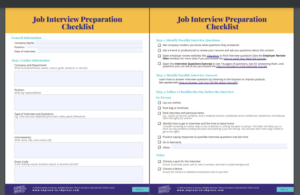Introduction
Hello! It’s Kristine here with the Express to Impress podcast. Today, we’ll be talking about answering interview questions. First, we’ll revisit the three things that make an interview successful. Then, we’ll dive into how to answer behavioral interview questions. Finally, we’ll hear a sample answer for the interview question, “Tell me about a time when you motivated a team.”
Can’t read now? Pin it for later!
If you have an interview coming up, I invite you to visit my website for my free five-step job interview preparation checklist. This checklist has already helped thousands of people worldwide perform well in interviews and get jobs they love. To sign up, visit my website at express-to-impress.com.
Now, let’s begin!
What Makes a Successful Interview?
Let’s quickly revisit your three goals in every job interview.
- First, you need to communicate the value you offer. What do you bring to the table that other candidates don’t? What makes you capable of performing the job? Also, what can you do for the company to make things better? The content of your answers, combined with your poise, delivery style, and communication skills, informs the interviewer of the value you offer.
- Second, you must convince the interviewer you are a good fit. Your interviewer has to be convinced you would fit well into the culture and that you share the company’s values.
- Third, you must come across as likable. Your interviewer has to feel good around you. They have to feel so comfortable around you that they wouldn’t mind seeing and working with you nearly every day! They have to believe that they would get along with you, enjoy your company, and be productive alongside you.
Now, let’s look at some tips for answering interview questions.
Tips on Answering Interview Questions
While I usually share a story and then tips, it makes more sense to share tips and then an example putting the tips into practice in this episode. So, let’s dive right into tips for answering behavioral interview questions.
Behavioral interview questions are common in the job interview process and are exactly like the name implies. You will be asked to describe how you behaved in situations in the past, which will help the interviewer predict how you might behave in the future. Behavioral interview questions often start with the phrase, “Tell me about a time…”
When you’re answering a behavioral question, you should always answer following a structured format. That way, you will provide everything the interviewer is looking for and answer the question within 90 seconds or less. For example, you may have heard about the STAR method, where S = Situation, T = Task, A = Action, and R = Result. If you’re comfortable using this method and it works for you, keep it up! On the other hand, suppose you haven’t been using a format for your answers to behavioral questions. In that case, I recommend using the PAR method, where P = Problem, situation, or issue, A = Action, and R = Result or outcome. I prefer the PAR method because it’s easier to use.
Whether using the STAR or PAR method, describe your situation, problem, and task as concisely as possible. Spend more time on the actions you took, using plenty of action verbs. Finally, share the results, including measurable results, possible feedback from others, the impact the outcome had on your team or company, and anything you learned from the experience.
Of course, there are many stories you can tell to any given question, and there are different ways you can frame the stories. It’s important to have a very good understanding of the job description to understand what qualities and traits the employer wants in employees. That way, you can choose appropriate stories and tell them in a way that highlights certain attributes you bring to the table.
Story (Example Interview Answer)
Let’s look at a hypothetical answer from a team leader to the question, “Tell Me About a Time When You Motivated a Team.”
Last June, my six-person product development team was working on a prototype for a client. However, two team members tested positive for Covid-19. Morale sank. On top of that, we were working remotely, so it was harder to connect.
So, I set up an online meeting to check in on everyone and develop a new game plan.
I asked everyone how they were feeling and asked about their concerns and needs. They were worried their sick coworkers would develop severe cases of COVID and didn’t feel motivated to work on a project they no longer felt was feasible. They asked for more time to complete the prototype. It seemed reasonable enough. I told everyone something I appreciated about them, and I encouraged them to take care of themselves. I also asked the team members if they would be up for a remote happy hour and game night, and everyone agreed.
After the call, I contacted our client and explained the situation, and asked for more time. Fortunately, they agreed, which gave us the time needed to complete the task as a four-person team. I also checked in with all six members individually daily, asking them how they felt, if they needed anything for me, and reminded them to take care of themselves.
In the end, we submitted a great prototype, and more importantly, the team pulled together to support each other through a tough time. The two team members recovered and motivation levels returned to normal after a few weeks.
This answer took about 90 seconds to say. Whew! The team leader comes across as approachable, caring, reasonable, flexible, and knows how to build trust.
You have to cover all your bases while preparing for an interview. Identifying potential interview questions and coming up with answers to interview questions is your ticket to a job offer. Now you have a tried-and-true format to use when answering behavioral interview questions.
Let’s Work Together!
I love helping talented professionals introduce themselves to potential employers in job interviews and convince them they are the right person for the job. People perform best in interviews when they arrive educated about the interview process and have had opportunities to practice answering interview questions. So, every one of my interview clients gets access to my 90-minute online video course, “How to Succeed in a Job Interview.” During our time together, I help clients identify questions and answers, and of course, deliver their answers powerfully.
Here’s a review from a recent satisfied client:
“Kristine was super informative and a big help throughout the entire process. Not to mention, her website has insightful information, and her videos extend the learning outside of our session. I definitely recommend her for any interview coaching needs!”
To see pictures and more testimonials from my clients, visit my website at express-to-impress.com.
If you have an interview coming up–either a job interview, medical residency interview, fellowship interview, or academic interview–I would love to work with you. You can schedule a free consultation or book a mock interview with me on my website,
Tune in Next Week
That’s all for today! Thank you so much for listening to the Express to Impress podcast. I invite you to tune in next week to learn definitions for the idioms and phrases covered in this episode. If you found this episode useful, please remember to share it with a friend! See you next time. Bye!
Music By Lucas Knutter






Leave a Reply
Your email is safe with me.